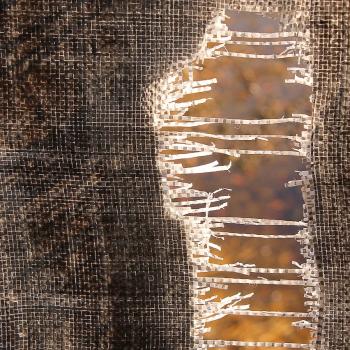
(This is an excerpt from my first book, Apparent Faith).
I have had thick glasses since I was about five; when you have glasses like mine, it is easy to get classified as smart and/or a little crazy. Growing up I was relatively short. I am not sure why most societies honor the taller people, but I seemed to never get picked for the team—no matter what game we were playing. The fact that my family growing up was relatively poor did not help either. Short, skinny, relatively low economic status, and glasses – from the pictures, I gather this led to some poor wardrobe choices. All this left me with an intense desire to fit in.
To make it worse, when I was seven years old a preacher convinced me I was rejected by God. Even now, I am trying to take inventory of just how evil a young man can be as a seven-year-old. I know it was not adultery and I hadn’t murdered anyone; I was not to the lusting stage yet and I hadn’t yet learned how to steal (that would come later when I went to a Christian school); I did not carve out any graven images and I had not yet learned how to cuss (again, the Christian school would help me learn that skill). There is always the possibility of not honoring my father and mother—but, for a timid soul, I am not sure that was a big issue. I kept the sabbath holy because I did not have a choice. I am pretty sure, at seven-years-old, it boiled down to coveting. From the time I was old enough to speak I wanted other children’s toys and vehemently yelled, “Mine!” So…God was going to torture me for that? The preacher did not use the word rejected. I was told that God had turned his back on me; kind of seems like the same thing to me.
No need to worry though—I walked to the front of the church that day, said the sinner’s prayer, and later the same month I got baptized. However, that did not stop me from sinning. In fact, later in life, I learned bigger and worse sins. I learned how to steal and lust, along with a myriad of other things prohibited by denomination and the Bible. I would have been classified as mischievous by most; the system I was in promoted shaming those that stepped outside of the boundaries of good behavior. These layers of shame and rejection built up inside me and I continued to shove them down. Eventually the trash bag overflowed, and I was left with the nagging feeling I did not belong. I was so sure God would never accept me. How could He with all the filth I had held inside?
When I had children, my experience of love and rejection got mixed up. I experienced love and affection like I had never felt, but also, I felt rejection like I would never have imagined. Most of the rejection I felt was simply my children transitioning through different stages in life and I was not prepared for those transformations. I felt it when my children preferred to play with their friends instead of me or when they chose to stay out all night with friends “just to talk.” When they were teenagers, they would lock themselves in their room and only come out for feedings and to find lost clothing items. “Go to your room” used to be a form of punishment but now it was punishing me.
I experienced feelings of rejection when they went to college. I felt rejected when they dated. At almost every stage of their lives, Laura had to explain to me that they were changing and doing what was natural. I felt rejection, but they were not rejecting me, they were going through a natural separation necessary to become responsible, independent adults. My children were quickly outgrowing, outpacing me. I was not chosen to be on their team – I was the short, wardrobe malfunctioned, seven-year-old boy with thick glasses all over again.
Remember the story about the preacher from earlier? I heard his voice in those moments with my children. I felt God was disappointed in my behavior as a parent. I did not shake my fist at God or wreck his car or destroy his favorite memorabilia, I was the same seven-year-old confused little child that believed everyone had rejected him.
At this point, I briefly thought it would be natural to take my feelings of rejection and just go ahead and reject my children. After all, if that is what God does, it must be okay. These feelings were very strong during their high school and early college years. My initial thoughts were probably something like “They do not want me—I do not want them”. Maybe I should just “turn my back on them” and get on with my life. I have seen some parents say to their children, “You are no longer my son/daughter.” But I could not do it! I cannot imagine doing so as a parent and I certainly cannot imagine God stooping to that level. If I was not able to do it, then how could God turn his back on me?
The story of how the Father feels about us is illustrated in the Parable of the Prodigal Son that shows the Father’s heart even after the son has rejected him and run away to spend his inheritance. When the son returns, the father races to meet him. The father let the child leave, but when the child was ready, the father rushed to meet him. When the child was at his worst, the father was watching and waiting for him. When the son changed his mind, the father revealed that his mind remained the same – He loved him. I have not always been like that, but I am learning.
What I want to believe is this: when we are at our worst, like a good parent, God draws closer to us, not further away. When I feel rejection, it is because of my own faulty understanding. To reject someone is to exhibit childish and adolescent behavior. Rejection is not a quality I can honestly ascribe to a God who is supposed to be love. I am not a great parent, but God is at least better than me. Rejection is not helpful—it is hurtful. It has taken at least half of my life to get over the repercussions of rejection. I cannot accept that God rejects us. I can only accept that as a good parent and a God of love He would notice my behavior, draw close to me, and say very simply, “I am with you.”
Be where you are, be who you are,
Karl Forehand
Support us on Patreon * The Desert Sanctuary Website
Karl Forehand is a former pastor, podcaster, and award-winning author. His books include Apparent Faith: What Fatherhood Taught Me About the Father’s Heart and The Tea Shop. He is the creator of The Desert Sanctuary podcast. He is married to his wife Laura of 32 years and has one dog named Winston. His three children are grown and are beginning to multiply!
Pre-order Being: A Journey Toward Presence and Authenticity

















